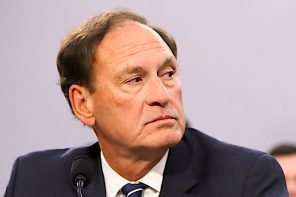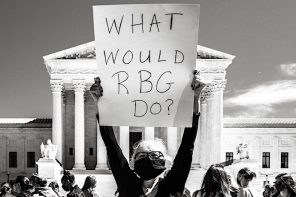Democrats for Life, which lost most of the members of its caucus in the Blue Dog wipeout of the 2010 midterms, is out with a statement about the Obama Administration’s impending decision on whether to expand the exemption from birth control coverage for employer-sponsored insurance plans. If the Administration does the Bishops’ bidding, employers could choose to exclude from insurance coverage the free contraception, mandated by HHS guidelines issued under the Affordable Care Act, based on “religious conscience,” even if the employer isn’t a church.
DFL executive director Kristen Day issued a statement predicting that the administration would indeed decide to expand the exemption, so that even nominally religious employers could refuse to cover contraceptives. Note the confidence, from her statement:
The Administration has no intention of forcing Catholic institutions to provide insurance coverage for services that are directly in opposition to their moral beliefs. It does not make any sense from a public policy perspective and it certainly is not smart politically to alienate Catholic voters.
Remarkably, DFL offers not one sitting member of Congress for comment on this issue. Instead, it offers former Congresswoman Kathy Dahlkemper (who was defeated in 2010) and former Congressman Bart Stupak, author of the notorious Stupak amendment, who chose not to run again in 2010. Presumably these two are offered to testify to what they believed they were voting for in the ACA (“conscience” protections), but it certainly is telling that there isn’t an actual sitting member of Congress offered to comment on DFL’s behalf.
But pro-choice advocates worry that Day’s confidence (however out of step her views are with rank-and-file Catholics) is well-placed. They say they expect imminent action from the Obama Administration to broaden the exemption beyond churches and other houses of worship. That action could come as early as tomorrow.
David Nolan, a spokesperson for Catholics for Choice, told me today, “Obama’s definitely listening to the bishops. The bishops seem to have significant sway over the administration, which can be seen by the fact Archbishop Dolan met with [Obama] last week and came out alleging that he felt much more at ease with what was going on after the meeting. Which seems to suggest that Obama made lots of conciliatory noises to the archbishop.” The archbishop, Nolan emphasized, does not represent American Catholics, but rather is “the leader of 271 active bishops, and that’s who he represents.”
Catholics for Choice has launched a campaign urging its supporters to call the White House and express that “Catholics overwhelmingly reject the bishops’ views on contraception” and that it “is discriminatory to deny these women and men access to this important provision simply because the institution where they work or the school they attend is religiously affiliated.” The ACLU has launched a similar campaign, arguing that religious freedom “does not mean that we get to impose those beliefs on others.”
“There is absolutely no reason to expand this exception,” said Sarah Lipton-Lubet, policy counsel for the ACLU. “There’s certainly no legal reason for it to be changed. The current rule doesn’t infringe on anyone’s religious liberty as a matter of law.”
As with the fight over the Stupak amendment, the Bishops’ concerns took precedence over those of rank-and-file Catholics, and certainly over those of non-Catholics. Stupak insisted, despite all evidence to the contrary, that the law was insufficient to prevent federal tax dollars from funding abortions. (The Hyde Amendment already does so.) As a result, he and the Bishops fought for an amendment that would result in restricting abortion coverage in the private insurance market, in their quest to restrict non-existent taxpayer funding of abortion coverage. After what they insisted was an inadequate restriction on abortion coverage eventually passed in the final bill, anti-choice groups vowed to redouble their efforts. The opposition to birth control coverage is just one of their targets.
The Bishops are attempting to box Obama into a corner by making this an issue of “religious conscience,” a strategy in line with their new campaign to frame others’ rights as an infringement of their religious liberty. If they don’t prevail, it will be just one more reason, in their minds, that their religion is being “neutered”—the term Dolan used just last week.
But if Obama does allow them to declare victory, it will set a dangerous precedent for the “religious liberty” claims of certain religious figures to stand in the way of people who do not share their religion, and in this case, even their co-religionists who challenge the leadership’s orthodoxy. Like Catholic women over the age of 18 who are just as likely to have used contraception as the general population. All 98% of them.
For an update, see this post.




